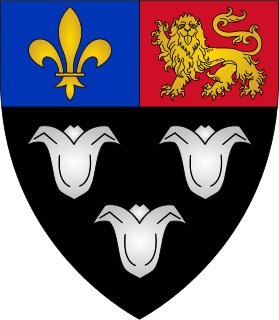John Mere is the second recorded Registrary [1] of the University of Cambridge. [2]
The Registrary is the senior administrative officer of the University of Cambridge. The term is unique to Cambridge, and uses an archaic spelling. Most universities in the United Kingdom and in North America have administrative offices entitled "registrar" or "the registry", although typically with substantially less official responsibility than the Cambridge post.

The University of Cambridge is a collegiate public research university in Cambridge, United Kingdom. Founded in 1209 and granted a Royal Charter by King Henry III in 1231, Cambridge is the second-oldest university in the English-speaking world and the world's fourth-oldest surviving university. The university grew out of an association of scholars who left the University of Oxford after a dispute with the townspeople. The two 'ancient universities' share many common features and are often referred to jointly as 'Oxbridge'. The history, influence and wealth of the University of Cambridge has made it one of the most prestigious universities in the world.
Mere was born in Mayfield, East Sussex, went to school at Eton and entered King's College, Cambridge in 1521. He graduated BA in 1526 and MA in 1529. During his years in Cambridge Hobys resided in the parish of Great St Mary's. He was Esquire Bedell from 1530 until his appointment as the university's senior administrative officer (Registrary) in 1543. [3] He died on 13 April 1558.

Eton College is a 13–18 Public School for boys in the parish of Eton, near Windsor in Berkshire, England. It was founded in 1440 by King Henry VI as Kynge's College of Our Ladye of Eton besyde Windesore, as a sister institution to King's College, Cambridge, making it the 18th-oldest Headmasters' and Headmistresses' Conference school. Eton's history and influence have made Eton one of the most prestigious schools in the world.

King's College is a constituent college of the University of Cambridge in Cambridge, England. Formally The King's College of Our Lady and Saint Nicholas in Cambridge, the college lies beside the River Cam and faces out onto King's Parade in the centre of the city.
A Bachelor of Arts is a bachelor's degree awarded for an undergraduate course or program in either the liberal arts, sciences, or both. Bachelor of Arts programs generally take three to four years depending on the country, institution, and specific specializations, majors, or minors. The word baccalaureus should not be confused with baccalaureatus, which refers to the one- to two-year postgraduate Bachelor of Arts with Honors degree in some countries.




